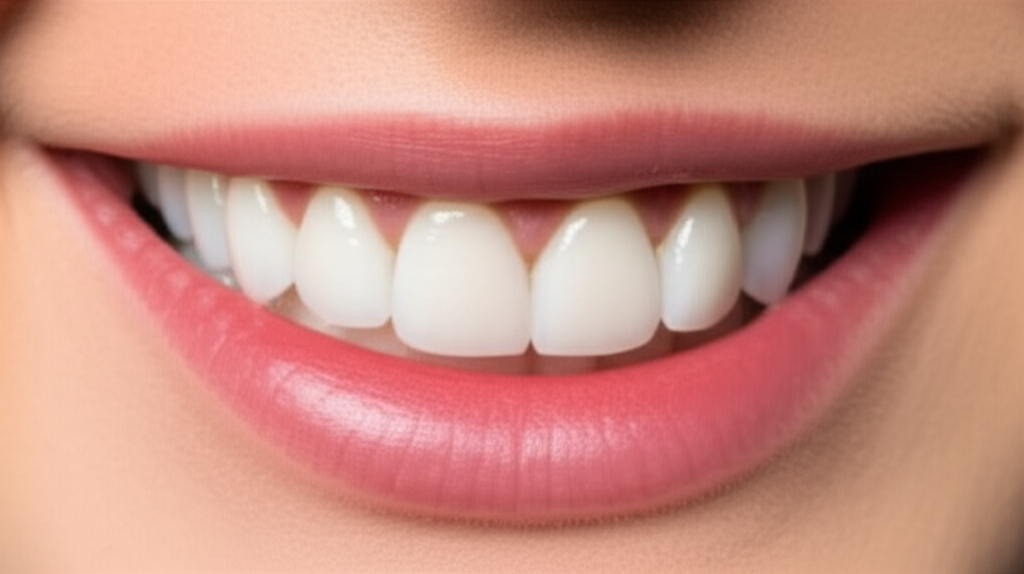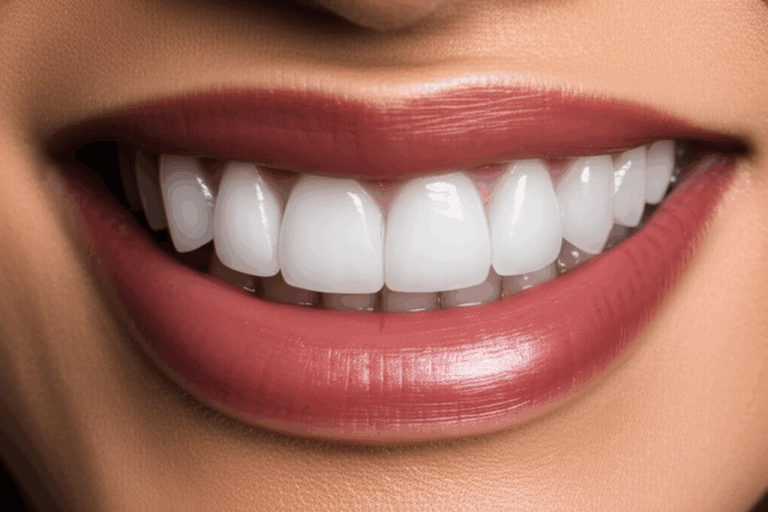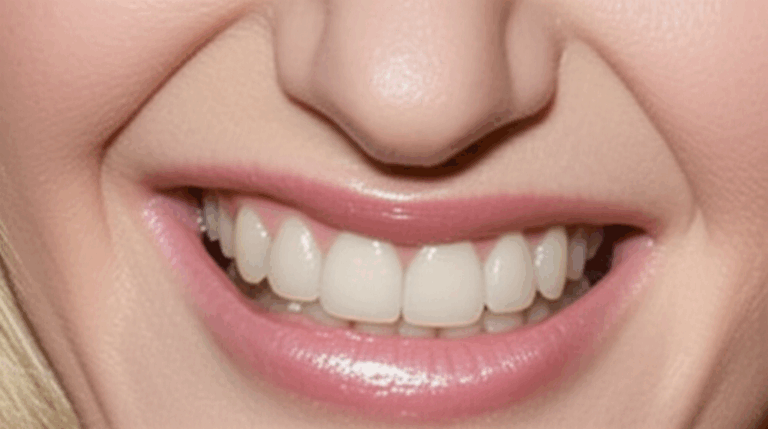
Do Veneers Make Your Teeth Look Bigger? Achieving a Natural, Proportional Smile
That nagging worry about ending up with “horse teeth” after getting veneers is more common than you might think. Maybe you’ve seen a celebrity flash a smile on TV and thought, “Wow, those teeth look huge!” Or maybe a friend said they regretted getting veneers because their teeth look bulky. It’s normal to feel worried about how cosmetic dental work could change your smile. You want an upgrade—not a huge, fake look.
So, do veneers make your teeth look bigger? Not really. With good planning and skill, veneers can give you the nice, balanced smile you want—without making your teeth look fake or too big.
In This Article
- Will veneers make my teeth look too big?
- What does “bigger” really mean?
- How veneers affect tooth size—and why that’s sometimes a good thing
- How dentists make veneers look natural
- What goes wrong? Why some veneers look too big
- Getting the smile you want: Talking with your dentist
- What are your options if you don’t want bigger teeth?
- The main ideas—how to get a smile you’ll love
Will Veneers Make My Teeth Look Too Big?
Let’s get this clear: Veneers don’t automatically make your teeth look bigger. They might change the length, width, or shape a little, but it really depends on your dentist, your needs, and what you want.
Here’s the main thing: Good cosmetic dentistry isn’t about making your teeth bigger. It’s about balance—matching your teeth to your mouth, lips, gums, and face. If done well, veneers just improve your smile.
Still nervous? Lots of people are! Many are scared to try dental veneers because they’re afraid of ending up with a big, fake smile. This article explains what really happens, why some fears pop up, and how to make sure you get a smile that feels right for you.
What Does “Bigger” Really Mean When It Comes to Veneers?
Let’s explain. When people ask if veneers will make their teeth “bigger”, they usually mean one of these things:
- Longer Teeth: Maybe you want to make short teeth a little longer.
- Wider Teeth: You want to close a gap, fix a narrow tooth, or make your teeth more even.
- Thicker Teeth: Putting material on top of your teeth can make them look fatter or bulkier, if not done right.
Looks Bigger vs. Actually Is Bigger
Here’s the trick: Veneers can change what size your teeth look—not just what they measure. Sometimes, just fixing the shape or making teeth line up gives the impression of bigger or more even teeth—even if the change is tiny.
Why are people afraid? Bad veneers, especially ones made without thinking about your face, can look awkward and bulky. Sometimes dentists skip important steps. When you see scary photos online, it’s easy to worry!
How Veneers Affect Tooth Size—And Why That’s Sometimes a Good Thing
Look at old family photos. Maybe your teeth always looked a bit short, uneven, or worn down? Possibly a chipped front tooth always stands out? Veneers can bring back natural balance and evenness. Let’s see why dentists suggest small (or not-so-small) size changes:
1. Making Short or Worn Teeth Longer
- Life, coffee, and grinding—they all wear down teeth. Over years, teeth chip, flatten, or get shorter.
- Gummy smile? Making teeth just a little longer can make your teeth match your gums better and look more grown-up.
2. Making Narrow Teeth Wider
- Some people have “peg” teeth (very slim side teeth) or gaps between teeth (diastema).
- Veneers widen these teeth to match the rest and make your smile look complete.
3. Adding More Shape or Fixing Odd Edges
- Teeth with chips, sharp edges, or strange shapes can look small or jagged. Veneers cover these, making everything look smooth and even.
4. Matching Everything Up
- If your front teeth don’t match in size, veneers can even them out so all your teeth look like they belong together.
Important: In most cases, any “bigger” look is tiny and on purpose—like patching a shirt, not buying a much larger size!
How Dentists Make Veneers Look Natural: The Art & Science
A great smile isn’t made with a cookie-cutter. Let’s look at how dentists create veneers that look real.
1. Golden Proportions & Smile Beauty
Many dentists use “Golden Ratio”—an old math rule seen in art, nature, and human faces—to decide what looks best. The width and length of your veneers are chosen so your smile fits you: your face, lips, and eyes.
2. What Does a Cosmetic Dentist Do?
Your dentist is both a planner and an artist:
- Checking Everything: Before starting, your dentist studies your smile, looking at:
- Face shape
- Lips
- Gums
- Digital Smile Design (DSD): New tech can show you a preview of your new smile on a screen. No surprises.
- Wax-Ups & Temporaries: Some dentists make fake “try-on” veneers you can wear first to see if you like the size and look.
3. Shaping Teeth (Prepping for Veneers)
A little technical, but important. Sometimes the dentist needs to shave a tiny layer off your teeth to make space for the veneer. Not doing enough, or skipping this, can make things look lumpy, but doing too much is also risky.
- Tiny Changes: Usually, just a thin layer (about 0.3 to 0.7mm) is taken away if needed.
- No-Prep Veneers: Some super-thin kinds (like Lumineers) might not need any shaving, but they don’t work for everyone.
4. Materials & Thickness Matter
Not every veneer is made the same! The best ones—like Emax, zirconia, or top-quality ceramics—can copy real tooth shine and color. Some are as thin as a contact lens, so they blend right in.
What Goes Wrong? Why Some Veneers Look Too Big
When the process is rushed, or the dentist isn’t careful, problems happen. Here’s why veneers sometimes look too large:
1. Inexperienced Dentist
Making nice veneers takes both art and practice. In the wrong hands, you might get a smile that is way too large and way too white for your face.
2. Skipping Planning Steps
Not using digital previews, wax models, or try-on veneers can cause confusion and mistakes.
3. Not Being Clear
If you don’t clearly tell your dentist what you want—or don’t want—they might guess and get it wrong.
4. Bad Tooth Shaping
- Too Little Shaving: Veneers sit on top of teeth, looking bulky.
- Too Much Shaving: Teeth get weak.
5. Wrong Material or Color
Using very solid materials or super white shades can look fake, especially if your other teeth aren’t that bright.
The Main Point: Pick a dentist who plans very carefully, listens to you, and works with a good dental ceramics lab to make your veneers.
How to Get the Smile You Want: Talking With Your Dentist
You are a big part of this! Here’s how you can get the result you want:
1. Say What You Want
Tell your dentist exactly what you like or don’t like about your smile. Bring photos of smiles you love—or ones you don’t.
2. Ask Questions
- What will I need to do?
- Will you have to shave my teeth, and how much?
- What material will you use?
- Can I see a preview or try-on before it’s permanent?
3. Use Pictures and Previews
Many dental offices can show you digital previews or let you try temporary veneers so you can see how things will look and feel.
4. Speak Up
If your try-on veneers feel too big or too small, say something. This is your smile!
What are Your Options If You Don’t Want Bigger Teeth?
Veneers are great, but not your only choice. If you don’t want to make your teeth any bigger, try these:
1. Braces or Clear Aligners
If your main problem is crooked teeth, straightening them can make your smile look even—no need to add anything to your teeth.
2. Gum Shaping
Sometimes the problem is your gums, not your teeth. Gum shaping (also called contouring) can make teeth look longer by showing more of each tooth.
3. Dental Bonding
For small chips or little gaps, tooth-colored filling can be used to fix things quickly—often with no drilling.
Common Patient Worries—And Real Answers
Let’s talk about some common fears:
Will my veneers feel thick or clumsy?
Not if you choose a dentist and dental technician who know what they’re doing. Super-thin veneers, made by a good digital dental lab, can look and feel just like natural teeth.
Can veneers make my teeth smaller than they were before?
Usually, veneers add a thin layer, so teeth can’t really be made smaller. Sometimes, lots of tooth shaving plus veneers may make teeth look less big, but this is rarely a good idea.
What if I don’t like the result?
Seeing your preview—on screen or with temporary veneers—means you can decide before it’s permanent. Always speak up before final glue is used.
How long do veneers last?
With brushing, flossing, and regular checkups, good veneers last 10–15 years, or even more.
Who Should Get Veneers?
Veneers are perfect for adults with:
- Chipped, cracked, or worn teeth
- Bad stains that can’t be cleaned off
- Small gaps or mild crowding
- Teeth that don’t match in size or shape
Maybe hold off if you:
- Grind your teeth a lot
- Have gum disease that isn’t treated
- Need major bite or tooth fixing (braces or aligners might work better)
- Really don’t want your teeth to get any bigger
If you have allergies or are sensitive to some materials, ask your dentist about what’s used. Most new veneers are very safe.
The Dentist’s Toolbox: How Veneers Are Made Just for You
Did you know most good veneers are made one at a time by skilled makers? They’re not just stickers—think of them as a custom outfit. Modern dental labs use simple digital scans and color checks to make sure each veneer matches your real teeth.
For special cases, your dentist might work with a china dental lab to get the best results.
Quick Reference Table: Veneers and Tooth Size
| Aspect or Step | What Usually Happens | How It Affects Size |
|---|---|---|
| Enamel taken off | 0.3mm–0.7mm (very little) | Helps avoid teeth looking thick |
| Veneer thickness | 0.3mm–1.2mm (porcelain) | Thinner = more natural look |
| Why do veneers? | Cover chips, add length, close gaps | “Bigger” is a small, careful fix |
| Can you try first? | Digital previews, wax models, temporaries | See and feel before deciding |
| If dentist is skilled? | High (most people happy) | Teeth look normal and natural |
| Risk of teeth looking too big | Low with good planning | Right process = real-looking smile |
The Main Thing: How to Get The Smile You’ll Love
You’ve learned that veneers are about making your smile better, not just making teeth big. Remember:
Points to Know:
- Veneers do not always make teeth look bigger. With the right dentist, they make your smile look better and more balanced.
- Most size changes are very small and are meant to fix something, not to give you a huge grin.
- Most problems come from bad planning, poor communication, or lack of skill—not from the materials.
- You help decide the final result! Always ask questions, share what you want, and see a preview before you say yes.
What To Do Next:
The best veneers should only have one “giveaway”—you smiling with confidence. Only you will know; everyone else will just see natural, great teeth.
Remember: Every smile is as unique as the person wearing it. Veneers are not a quick shortcut—they’re a custom fix to make your smile both look good and work well.
Excited to get your best smile? Book a chat with a trusted cosmetic dentist, talk honestly about what you want, and look at every option together. That way, you’ll always get a smile that fits you—because the best smile is designed just for you.
Learn more about great dental lab work from a top veneer lab or see how digital planning works at a digital dental lab.








